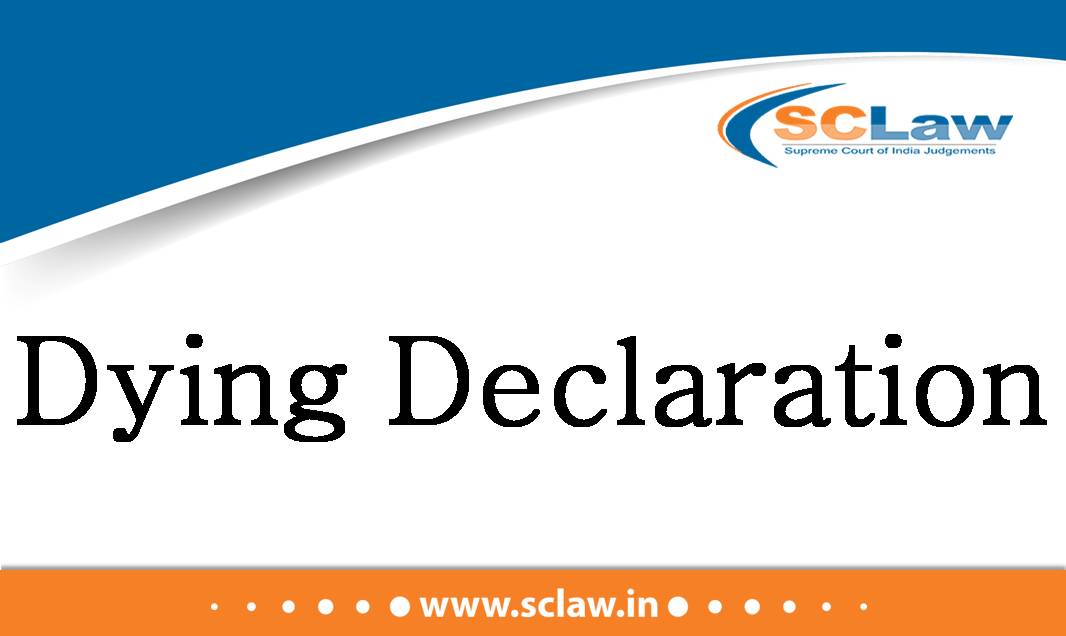Contract Act, 1872 – Section 23 – Void contract – Agreement that employee would not claim higher salary on being promoted by stop-gap arrangement – Agreement is opposed to public policy and not valid.
AIR 1998 SC 2909 : (1998) 79 FLR 657 : (1998) 3 JT 654 : (1998) 3 SCALE 388 : (1998) 5 SCC 87 : (1998) SCC(L&S) 1273 :…
Execution of sale deed – The appellants/ plaintiffs were non-suited by the High Court on the finding that the sale deed was without consideration executed and registered – The High Court has reversed the decree of the appellate Court and confirmed, though for different reasons, the decree of the trial Court.
(1996) 2 AD 435 : (1996) 1 CTC 360 : (1996) 3 JT 52 : (1996) 2 SCALE 214 : (1996) 2 SCC 624 : (1996) 1 SCR 1152…
Penal Code, 1860 (IPC) – Sections 302/149 – Murder – Reversal of acquittal by High Court – Prosecution case fully corroborated by evidence of brother of deceased – Appellant identified in TIP
(2011) CriLJ 2897 : (2011) 3 JCC 1559 : (2011) 5 JT 403 : (2011) 3 RCR(Criminal) 782 : (2011) 5 SCALE 139 : (2011) 4 SCR 25 :…
Terrorist & Disruptive Activities (Prevention) Act-Section 20(4) Charge-sheet – Limitation for filing – Computation of – It is to be counted from the next day of arrest.
(1996) 1 AD 478 : AIR 1996 SC 2980 : (1996) CriLJ 1876 : (1996) 1 JT 248 : (1996) 1 SCALE 307 : (1996) 2 SCC 367 :…
Civil Procedure Code, 1908 (CPC) – Order 6, Rule 17 – Amendment of written statement, in a suit for injunction which was filed on the ground that defendant was a licencee, however the defendant pleading to be lessee
AIR 2000 SC 614 : (2000) 1 CTC 163 : (1999) 10 JT 61 : (2000) 125 PLR 547 : (1999) 7 SCALE 463 : (2000) 1 SCC 712…
Contempt—Willful disobedience—If a person has been asked to something which is impossible and if he fails to do so, he cannot be held guilty of contempt.
2016(5) Law Herald (P&H) 3751 (SC) : 2016 LawHerald.Org 2356 IN THE SUPREME COURT OF INDIA Before The Hon’ble Mr. Justice Anil R. Dave The Hon’ble Mr. Justice Uday Umesh…
Limitation—Exclusion of Time—Both due diligence and good faith must be established. Limitation—Exclusion of Time—Nothing shall be deemed to be done in good faith which is not done with due care and attention.
2016(5) Law Herald (P&H) 3748 (SC) : 2016 LawHerald.Org 2355 IN THE SUPREME COURT OF INDIA Before The Hon’ble Mr. Justice Kurian Joseph The Hon’ble Mr. Justice Rohinton Fali…
Dying Declaration–100% Burn Injuries—Not a ground in itself to discard dying declaration when there was a specific certificate from the Doctor about her mental fitness regarding capability of giving the statement.
2016(5) Law Herald (P&H) 3732 (SC) : 2016 LawHerald.Org 2166 IN THE SUPREME COURT OF INDIA Before The Hon’ble Mr. Justice A.K. Sikri The Hon’ble Mr. Justice Amitava Roy Criminal…
False Statement—Income Tax Officer is a Civil Court—Person making false statement to income tax officer during search/raid—Complaint under S. 195 CrPC is maintainable. False Statement—For a valid complaint under S.I95 of CrPC, the mandate thereof has to be essentially abided.
2016(5) Law Herald (P&H) 3714 (SC) : 2016 LawHerald.Org 2368 IN THE SUPREME COURT OF INDIA Before The Hon’ble Mr. Justice Pinaki Chandra Ghose The Hon’ble Mr. Justice Amitava Roy…
Contempt—Once an advocate is convicted of an offence involving moral turpitude, his licence to practice will stand suspended for a period of two years.
2016(5) Law Herald (P&H) 3713 (SC) : 2016 LawHerald.Org 2367 IN THE SUPREME COURT OF INDIA Before The Hon’ble Mr. Justice Kurian Joseph The Hon’ble Mr. Justice Rohinton Fali Nariman…














